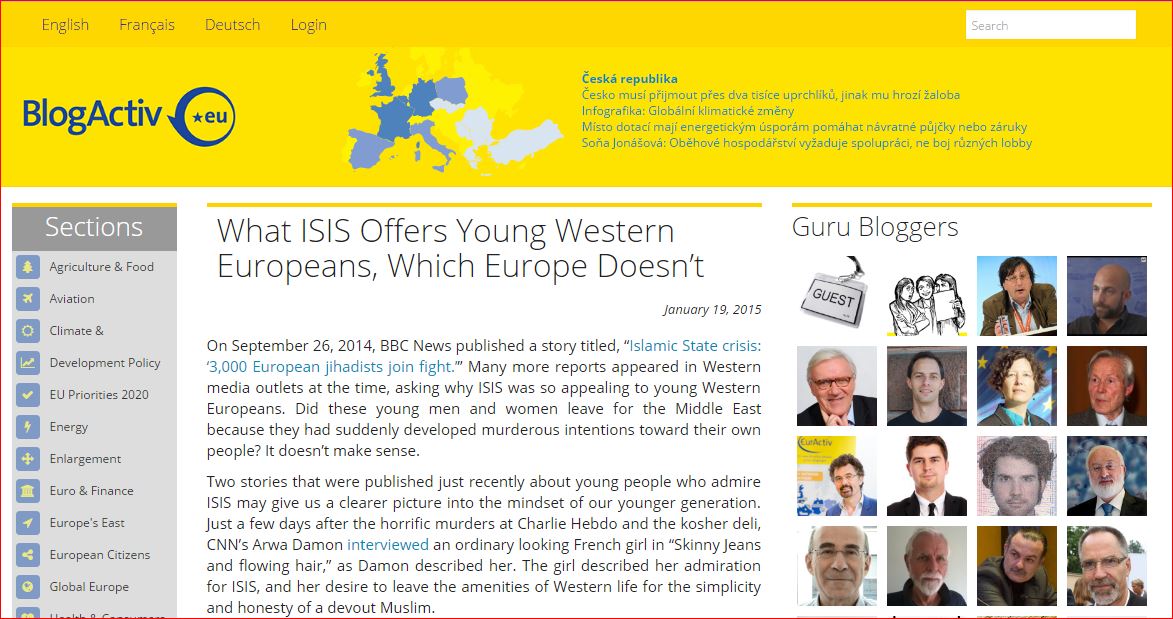
On September 26, 2014, BBC News published a story titled, “Islamic State crisis: ‘3,000 European jihadists join fight.’” Many more reports appeared in Western media outlets at the time, asking why ISIS was so appealing to young Western Europeans. Did these young men and women leave for the Middle East because they had suddenly developed murderous intentions toward their own people? It doesn’t make sense.
Two stories that were published just recently about young people who admire ISIS may give us a clearer picture into the mindset of our younger generation. Just a few days after the horrific murders at Charlie Hebdo and the kosher deli, CNN’s Arwa Damon interviewed an ordinary looking French girl in “Skinny Jeans and flowing hair,” as Damon described her. The girl described her admiration for ISIS, and her desire to leave the amenities of Western life for the simplicity and honesty of a devout Muslim.
On the same day when Damon’s story was released, The New York Times published a story titled, “The Jihadist in Our Family,” about a quiet, Malaysian Muslim man who was devoted to his family, to his young students at the mosque, and to Allah. His faith had led him to believe that life was meaningless unless you used it to grow closer to God. And the way to grow closer, he believed, was to become a shahid, a martyr for Allah. He went to Syria and succeeded in his mission. In mid September of last year, he died in a Syrian Air Force strike in Hama, Syria.
These glimpses into the hearts of young ISIS recruits reveal the secret of its appeal. ISIS is offering a purpose in life: become a saint, and win God’s favor and eternal glory. In a world where people measure one another by the brands they wear, the gadgets they show off, and their credit in the bank, extreme religion offers what they perceive as a more meaningful purpose for existence. To many young Europeans, it is a far better offer than the latest model of iPhone.
After decades of consumerism, the emptiness in people’s hearts has grown so unbearable that they feel compelled to fill it at any cost. So they turn to the extremes. The extreme right is also gaining ground among them, but it cannot offer the antiquity, the sense of authenticity, and the promise of eternity that religion can. And so religion wins.
So what can we do to stop our kids from going that way?
First, we need to understand that the war against ISIS cannot be won on the virtual battleground. We cannot stop our kids from searching on the internet. Instead, we have to offer them what they are really looking for, a purpose, so they will not need to search for it on the internet.
If we want to find the answer to ISIS, we have to look within us, not without. Human spirit wins wars, not armed forces. The glam of Western culture has dimmed for our younger generation, so they are looking elsewhere.
Therefore, against the divisive message of extreme Islam, we must offer a message of unity and acceptance above all differences—religious, racial, cultural, and national. Such unity offers a sense of warmth, solidarity, and mutual responsibility. It is inherent in our nature to socialize, but we are taught to socialize and unite against others, to win or to subdue our rivals.
True unity doesn’t require an adversary. True unity embraces diversity, and channels it to our collective benefit. When we unite, we contribute our skills to the good of society, and in return, we benefit from the skills of all the people who have joined our unity. This way we gain so much that we stop feeling we have given anything. In fact, in such an atmosphere, giving becomes a joy even if you’re not naturally inclined to it.
And besides the gifts that we are showered by our connected society, we discover that unity contains a hidden bonanza: When you are truly connected, you feel your friends just like a mother often feels her child. Unity creates an “entity” all on its own, made of your joints efforts, and which can exist only as long as you all maintain your unity. This “entity” consists of your collective selves, as though a society of connected people creates an organism that consists of all its members. Much like cells in the body feel the entire body, whether it is cold or hot, or just right, connected people feel their unity as oneness, and gain depth of perception that is otherwise impossible to achieve.
It is this kind of society that we should offer to our children, one that fosters compassion, mutual support, warmth, and profound connectedness. If we succeed in our efforts, we will soon see a very different Europe.
Featured in BlogActiv